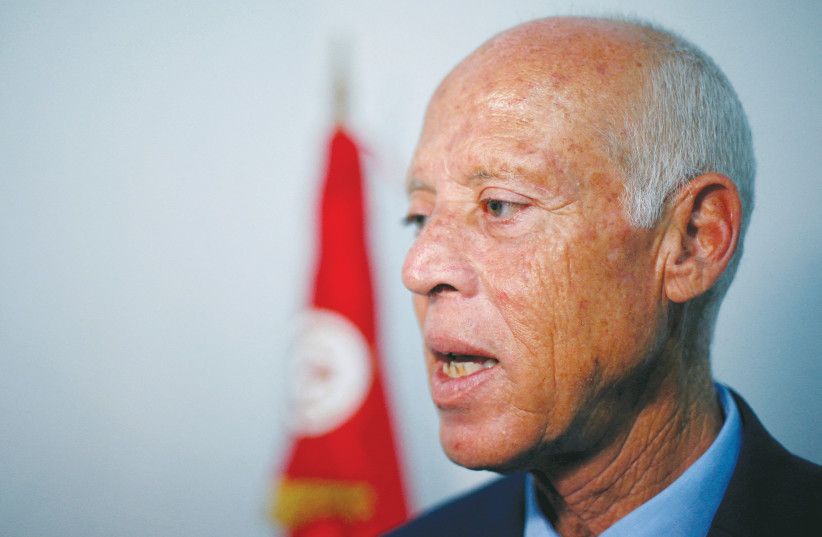The number of Tunisians fleeing their country and arriving on Italy’s shores has increased by 23% for the first eight months of 2022 compared to the previous year.
For more stories from The Media Line go to themedialine.org
According to a report by the Tunisian Forum for Economic and Social Rights (FTDES), the total number of Tunisians that have landed in Italy since January 2022 reached over 13,000, of which at least 2,000 are minors.
The report released on Wednesday added that about 500 Tunisians have either gone missing or lost their life during the attempt to flee to Italy by boat. The FTDES attributed the soaring number of asylum seekers to the political and economic crisis currently afflicting Tunisia.
Why are Tunisians leaving?
The Arab Spring originated in Tunisia in 2011. Tunisia was broadly perceived as the only Arab Spring country that successfully transitioned to a democracy when, in 2014, it adopted a constitution that created a hybrid parliamentary system. But, in July 2021, President Kais Saied declared a state of emergency and froze parliament, centralizing most of the country's powers with the president. The arrangement became official a
year later with the approval of a new constitution proposed by Saied.
"These difficulties increased after the outbreak of the Russian-Ukrainian conflict which led to exceptional increases in the prices of grain and energy resources."
Mario Savina

The concentration of power in the president is driving political problems in Tunisia, Federico Donelli, adjunct professor of Strategic Studies at the University of Trieste, explains.
"The current hyper-presidential regime has gradually eroded the fragile post-2011 rule
of law and seems destined to become a new authoritarian regime like that of Ben Ali,"
he told The Media Line, referring to the second president of Tunisia, who served from
1987 to 2011, until he was ousted during the Tunisian revolution.
Since the president suspended parliamentary activities, the number of Tunisians who have landed in Italy has increased, Donelli said, explaining that among those escaping there are many young people who initially supported Saied and whose support was a vote against the political elites who have ruled the country since the fall of the Ben Ali regime.
Concerning the economy, Donelli noted that public debt has exceeded 100% of gross domestic product, youth unemployment is at about 40%, and the Tunisian people lack some basic necessities.
Mario Savina, research analyst and North Africa Desk Coordinator at OSMED, told The Media Line that Tunisia has been in a position of economic precariousness for many years, which is reflected in the absence of job prospects for the younger population – especially in the poorest areas, who are in fact the most likely to emigrate.
He added that, due to several years of slow growth and rising unemployment levels in
the country, many Tunisians are currently struggling to afford basic necessities at home.
"These difficulties increased after the outbreak of the Russian-Ukrainian conflict which
led to exceptional increases in the prices of grain and energy resources," he continued.
In Tunisia, food prices have risen over 19%, and the government has not been able to
pay for grain shipments in recent months, Silvia Boltuc, managing director of the Special
Eurasia geopolitical analysis platform, told The Media Line.
In recent years Italy has applied the policy of open ports, receiving immigrants that
arrive by sea, although things could change if right-wing parties win in the national
elections later this month, she continued.
Currently, explains Boltuc, the migrant reception system in Italy operates on two levels.
The first includes hotspots and first reception centers where newly arrived migrants are
identified and can start the asylum application procedure.
There they receive their first medical attention, undergo health screening, are identified
and photo-marked, and then can apply for international protection, Boltuc adds.
After an initial evaluation, the migrants who apply for asylum are transferred to the first
reception centers, where they stay for the time necessary to find a place in the
Reception and Integration System.
While those who apply for asylum are moved to regional hubs pending evaluations, added Donelli, all others are taken to identification and expulsion centers and receive a rejection decree.
Tunisia is considered a safe country by Italy, Savina says. "The presumption of a safe country prevents Tunisians from accessing the protection and asylum system," he added.
<br>What types of challenges do immigrants to Italy face?
Boltuc says there are several additional problems that come with the North African migration to Italy.
She says that often the immigrants have no documents making it impossible to identify
them, and the reception centers are overwhelmed. Meanwhile, Italy is going through an economic crisis which doesn't allow the government to provide work for all the migrants.
"They get economic aid and subsidized services, but this is not enough. They often flee from reception centers and end up in the ranks of organized crime," she said of the migrants, adding that some do manage to find a job and live honestly and become well- integrated.
Italy is a common destination for African asylum seekers due to its geographical proximity to the North African coast. However, Boltuc points out that many do not intend to stay in Italy but to transit to
other European countries.
